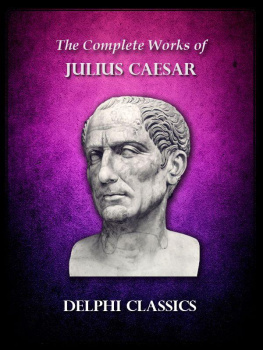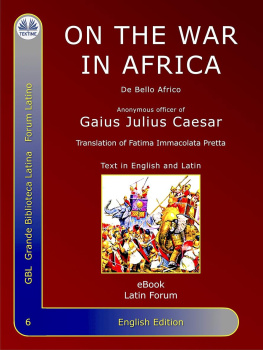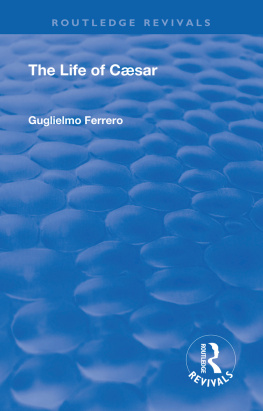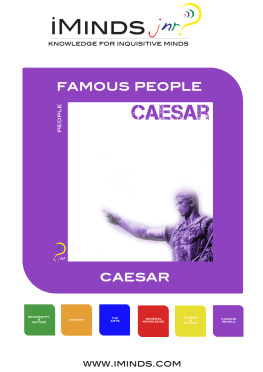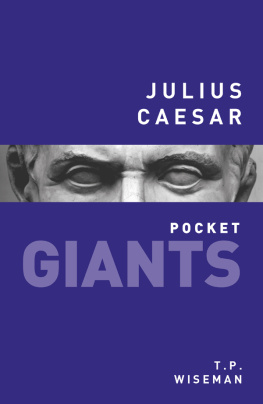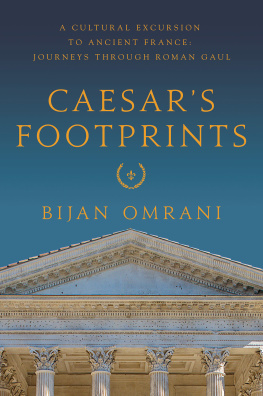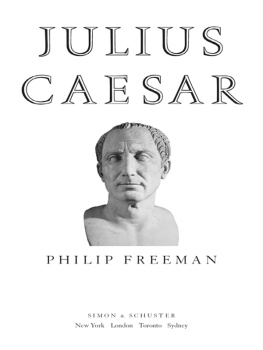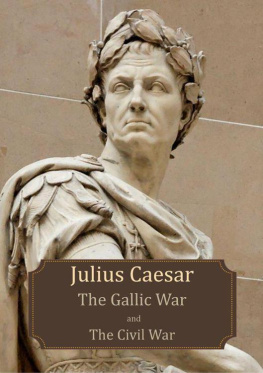Contents
Guide
Page List
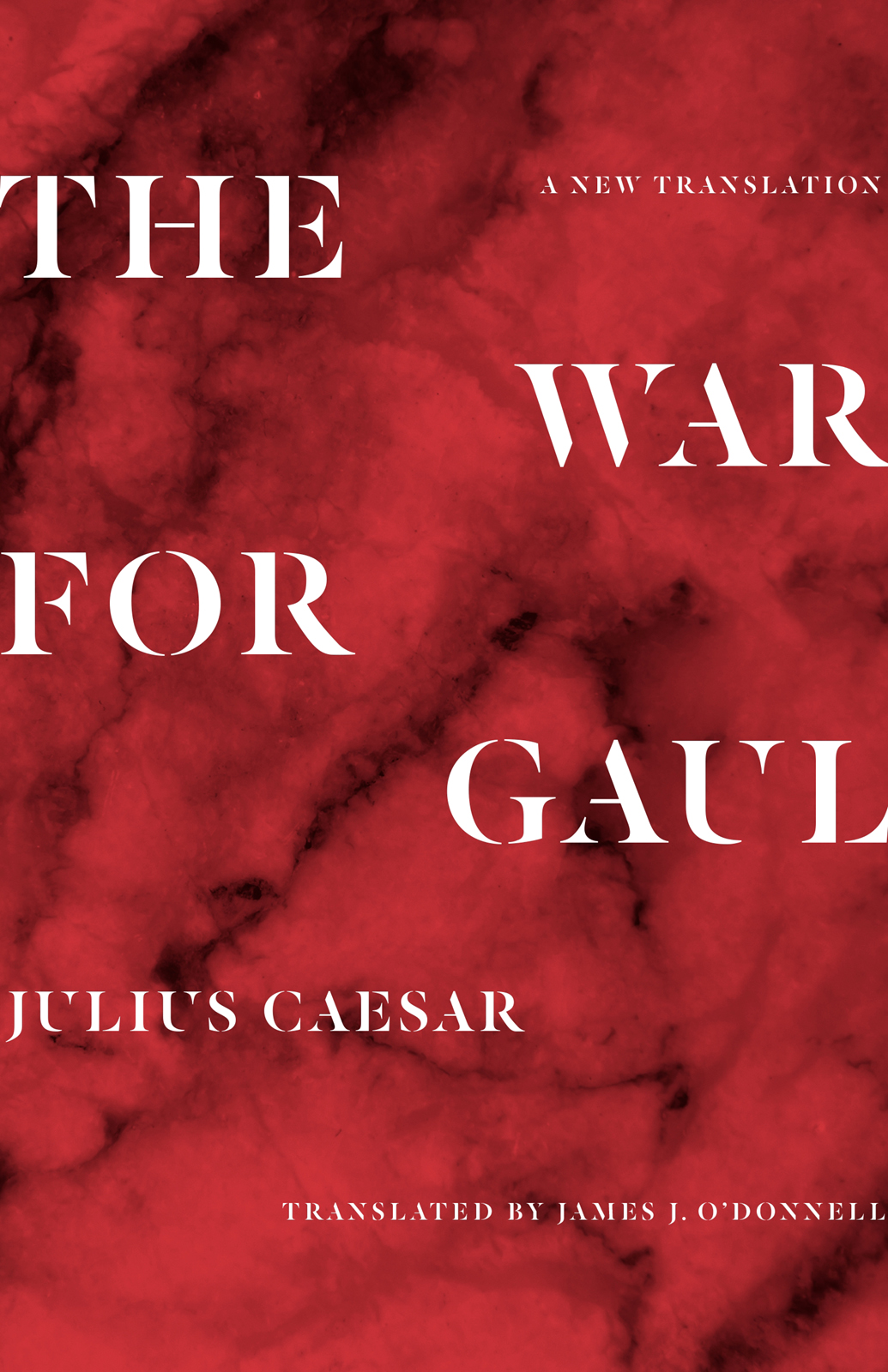
THE WAR FOR GAUL
THE WAR FOR GAUL
A New Translation
JULIUS CAESAR
TRANSLATED BY JAMES J. ODONNELL
PRINCETON UNIVERSITY PRESS
PRINCETON AND OXFORD
Copyright 2019 by James J. ODonnell
Requests for permission to reproduce material from this work should be sent to
Published by Princeton University Press
41 William Street, Princeton, New Jersey 08540
6 Oxford Street, Woodstock, Oxfordshire OX20 1TR
press.princeton.edu
All Rights Reserved
LCCN 2018948731
ISBN 9780691174921
eISBN 9780691186047 (ebook)
Version 1.0
British Library Cataloging-in-Publication Data is available
Editorial: Rob Tempio and Matt Rohal
Production Editorial: Debbie Tegarden
Text Design: C. Alvarez-Gaffin
Jacket Design: Matt Avery/ Monograph Studio
Jacket image is copyright Shutterstock
Production: Erin Suydam
Publicity: Jodi Price
Copyeditor: Emma Arrington Stone Young
Contents
vii
xliv
Introduction
C aesar deserves to be compared with Alexander the Great. No one before or since comes close. Command, conquest, and a lasting legacy set them apart from the likes of mere strivers like Napoleon or Hitler. And the war in Gaul was the making of Caesar.
Have I said that right? Isnt that what you would expect a translator of Caesar to say? Its all entirely true and many have said as much before. But saying just that makes you admire him without understanding him, makes you complicit in his ill-doing as well. This translation of his account of the war in Gaul will try to restore your objectivity and freedom of judgment. Make of him what you will.
* * * *
Cormac McCarthy should be the one to write the story of Caesar in Gaul. As insensitive and brutal as McCarthys Americans afoot in a land of native and Spanish peoples they wrongly took for uncivilized, Caesars armies had little excuse for what they did and they preferred not to remember it once done. But Caesar told their story coolly. Though people die in droves, horribly, on these pages, the Latin word for blood appears only twice, near the end.
The facts of the story must be made clear. A general with something to prove, a career to make, and plunder to be harvested for financial gain was handed an army and a province and a guarantee he would have both for long enough to make serious mischief. He spent nine years battering his way through his province and the rich and promising lands beyond, bullying allies and brutalizing the resistant. By the time he was through, the lands and peoples that obeyed his commandsand those of his successors for another half millenniumhad been vastly increased, and he was poised to make himself master of the world, or at least the world that stretched from the English Channel to Damascus.
He had no business doing any of this. His colleagues admired his chutzpah, knowing that he went far beyond every reasonable moral or legal boundary. His excesses were possible because he was in competition with two other monsters, one of whom fell in battle at the opposite end of the world while Caesar was in Gaul, the other of whom let Caesar go too long, then fought him, then fled, and ended up hacked to death by the minions of a king who thought it prudent to curry favor with Caesar.
But the book Caesar wrote is magnificent: amoral, certainly, but clear, vivid, and dramatic, a thing to be remembered and read for the ages. Books about war often make us sympathize with the wretchedness of the victims. This one forces us to be Romans of the kind its author wanted to be. We read it nervously, cheering for a bullfight we didnt want to attend and dont approve of, admiring the grace of the awesome minuet that floods the sand with blood. There is no denying that this is a great work of literature, one of the greatest, and at the same time, there should be no denying that it is a bad mans book about his own bad deeds. I think it is the best bad mans book ever written.
But many will resist my saying the plain fact. Because his carven prose depends on a deliberately restrained vocabulary and a terse, correct style, the book has been thought suitable for schoolboys for many generations, until about the time Latin schoolmasters discovered finally that women can read too. Now the book is in disfavor, for the wrong reasons: because it is about war, and because it is too easy. But we all need to read books about war if we are to avoid dying in one, and this book is anything but easy.
The best reasons for not teaching this book to the young are that it gets war exactly right and morals exactly wrong, and that it achieves a crystalline purity of style that looks easy from every angle but proves to be sternly difficult and demanding when faced flat on. This is a book for the middle-aged and sober, for those who know that the world is not run according to their tastes and never will be, for those who listen best to the author who has truly mastered his language, whatever he has to sayand who think that such an author must indeed have something important to say and hear.
The book pretends to be a set of notebooks, commentarii, the sort of official memos generals sent home to inform their masters of their deeds, the sort historians could come along and use to construct genial and politically agreeable accounts of great events. The style is meant to look simple and to seduce. When we read it, we are meant to think we are getting the plain facts, direct and unvarnished. The old maxim is ars est celare artemnever let em see you sweat captures the sense of that shopworn Latin phrase. Nobody ever saw Caesar sweat.
Translators of Caesar have always been helpfulmuch too helpful. Surely, they think, the reader just wants to know what really happened. Caesar would be pleased to think thats what we think hes offering. The effect of this connivance with the general is not only to be found in the maps and diagrams and illustrations that go with the best translations but in the expansiveness and preemptively explanatory construction of every sentence. The translations Ive looked at in English generally add almost as many words again as Caesar needed in the original, so that he becomes downright chatty and helpful. No. This book is fiercely austere, for brave and attentive readers, ready to march twenty-five miles a day under full pack and be ready for more tomorrow.
GAUL
Caesar has us imagine that he has invaded a land of Wild West instability and aggressiveness and tamed it for civilization. No.
Where and what was Gaul? The province Caesar was formally assigned included the Roman territories of Illyricum (the east coast of the Adriatic), Cisalpine Gaul (what is now Italy north of the Apennines and south of the Alps, running from Turin to Venice), and the old Roman province, both what is now called Provence and the strip of further Roman territory along the Mediterranean coast linking to Spain. The Roman proconsul normally sat at Modena, halfway between Rimini and Piacenza along the Emilian Way (the marching road already plotted out by the Romans in 187 BCE). Caesar would grant citizenship to Cisalpine Gauls residents in 49, and Octavian would formally dissolve that province and fold all Italy into a single jurisdiction in 42.
That province of Transalpine Gaul was what the Romans had claimed after the Punic Wars, to secure the coast and a path to Spain. The modern cities of Aix-en-Provence and Narbonne descend from settlements designed to secure the eastern and western segments of their holdings. Strictly speaking, Cisalpine Gaul and that province were the Gaul Caesar was assigned to govern and protect.


